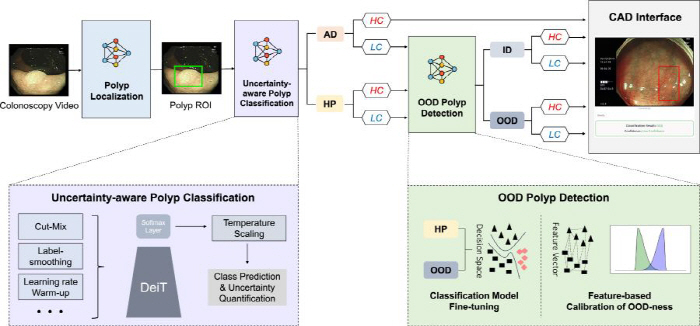Seoul National University Hospital Develops a Precision Classification AI System for Colorectal Polyps...Classified by up to 79.7% accuracy
|
A joint research team led by Professor Lee Dong-hun of the Department of Radiology at Seoul National University Hospital and Professor Kim Hyung-shin of Seoul National University Graduate School of Data Science announced on the 17th that it has developed a colonoscopy computer diagnosis assistance system 'ColonOOD' by learning and verifying based on about 3,400 colonoscopy data registered in four medical institutions and public datasets in Korea.
According to recent national cancer registration statistics, colorectal cancer is a major carcinoma that ranks second in cancer incidence and third in mortality in Korea. However, it is known that rapid and accurate diagnosis of polyps with colonoscopy can reduce colorectal cancer mortality by up to 53%. Colorectal polyps are mainly divided into 'adenomatous polyps (high risk)' and 'hyperplastic polyps (low risk)', and computer-aided systems (CAD) are currently being introduced in colonoscopy to quickly and accurately diagnose this type.
However, most existing systems can only classify polyps into two main types, so the incidence is rare or there is a limit to detecting new polyps. Therefore, a new diagnostic aid was needed, equipped with a small number of types of out-of-distribution (OOD) that had never been trained, providing reliable results for medical staff.
Accordingly, the research team developed a diagnostic assistance system 'ColonOOD' that automatically classifies the location and type of polyps based on colonoscopy images. The system has the ability to detect the distribution of minority types of polyps by learning the distribution of major polyps. In addition, it supports accurate decision-making by endoscopic specialists by presenting the confidence level (High, Low) of the classification results that were not provided in the existing model when classifying polyps.
Using this, high-risk polyps can be classified first. For other types, additional analytical models operate to distinguish between low-risk polyps and potential-risk 'minority-type polyps'. This classification performance was verified based on data from four medical institutions (Seoul National University Hospital Gangnam Center, Seoul Asan Hospital, Severance Hospital, and Ewha Womans University Seoul Hospital) and two public datasets, and it was found that all polyps were classified with up to 79.7% accuracy and up to 75.5% of all minority types of polyps were accurately detected.
In other words, the research team explained that ColonOOD automatically detects the location of polyps and selects certain high-risk polyps, and precisely analyzes polyps whose classification is uncertain once again to confirm whether they are of minority types.
Professor Dongheon Lee (Department of Imaging Medicine) "This is the first study to integrate a small number of types of polyp detection modules into the existing AI-based colonoscopy diagnostic assistance system, and we expect clinicians to significantly improve diagnostic accuracy depending on the level of confidence by utilizing the prediction results of ColonOOD proposed in this study."ColonOOD, which reflects the actual clinical environment, is expected to be highly utilized in the medical field, and will be expanded to prospective and multicenter studies in the future to verify its feasibility."
Meanwhile, the study was published in the latest issue of the prestigious international journal Expert Systems with Applications (IF; 7.5) in the field of artificial intelligence.
|
This article was translated by Naver AI translator.





